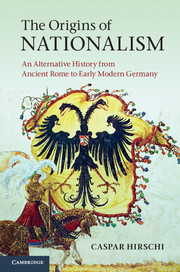Book contents
- Frontmatter
- Contents
- Figures
- Preface
- 1 Introduction
- 2 The modernist paradigm: strengths and weaknesses
- 3 Foundations of a new nationalism theory
- 4 Killing and dying for love: the common fatherland
- 5 Competing for honour: the making of nations in late medieval Europe
- 6 The nationalist transformation of borders and languages
- 7 Humanist nationalism
- 8 A German Emperor for the German people
- 9 Nation and denomination
- 10 Conclusion
- Bibliography of works cited
- Index
- References
5 - Competing for honour: the making of nations in late medieval Europe
Published online by Cambridge University Press: 05 June 2012
- Frontmatter
- Contents
- Figures
- Preface
- 1 Introduction
- 2 The modernist paradigm: strengths and weaknesses
- 3 Foundations of a new nationalism theory
- 4 Killing and dying for love: the common fatherland
- 5 Competing for honour: the making of nations in late medieval Europe
- 6 The nationalist transformation of borders and languages
- 7 Humanist nationalism
- 8 A German Emperor for the German people
- 9 Nation and denomination
- 10 Conclusion
- Bibliography of works cited
- Index
- References
Summary
Would it not be expedient, because of the jealousy between nations about the Papacy, to transfer the Papal seat from nation to nation …? It would then emerge, against the will of naysayers, which nation has the best candidate, if chronicles are written about them all.
Anonymous, Avisamentum, Council of Constance 1415Farewell, all Germans, and do not allow our praise, our glory and our honour to be ruined by words and especially by weapons!
Heinrich Bebel, Apologia contra Iustinianum, 1509From Antiquity to the late Middle Ages, the word ‘nation’ (natio) largely lacked positive political or emotional meaning. Compared to patria, it had to undergo an even profounder transformation in a much shorter period to become the main term and eponym of nationalism. This transformation started at the beginning of the fifteenth century and was completed by its end.
Natio is derived from nasci, which means ‘to be born’. Romans used the word to indicate their place or province of birth within the Roman Empire; one could be natione – that is ‘by birth’ – Sicilian, Macedonian or Dalmatian. The phrase was a regular component of the short biographical descriptions on tombstones. It rarely implied belonging to a community of the same name, whose members shared singular histories and habits. It was an individual designation of geographical origin in a mobile society, and it was mostly void of further political or cultural meaning.
- Type
- Chapter
- Information
- The Origins of NationalismAn Alternative History from Ancient Rome to Early Modern Germany, pp. 78 - 103Publisher: Cambridge University PressPrint publication year: 2011



